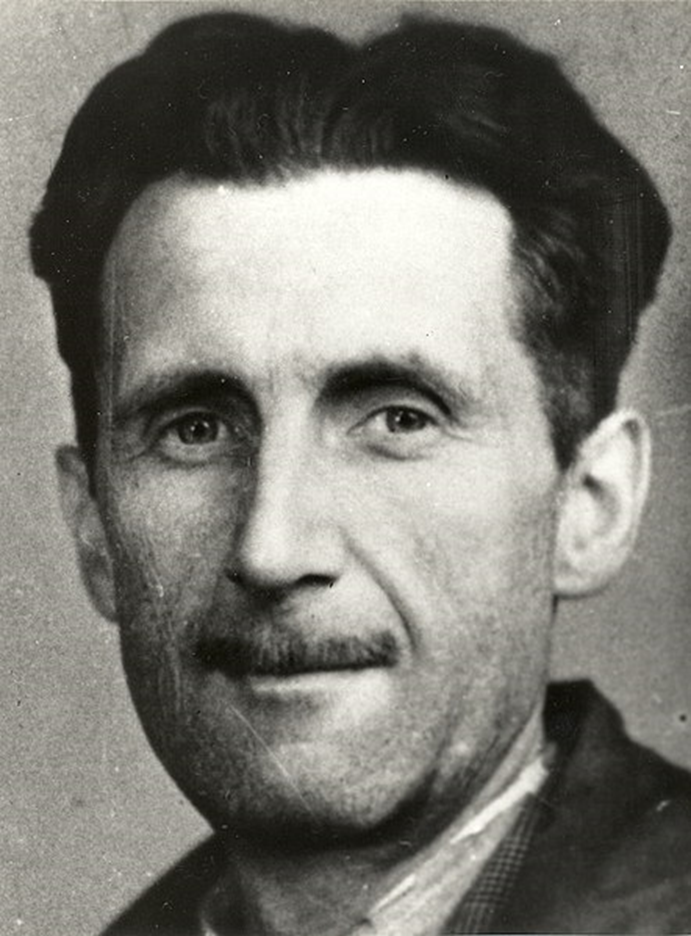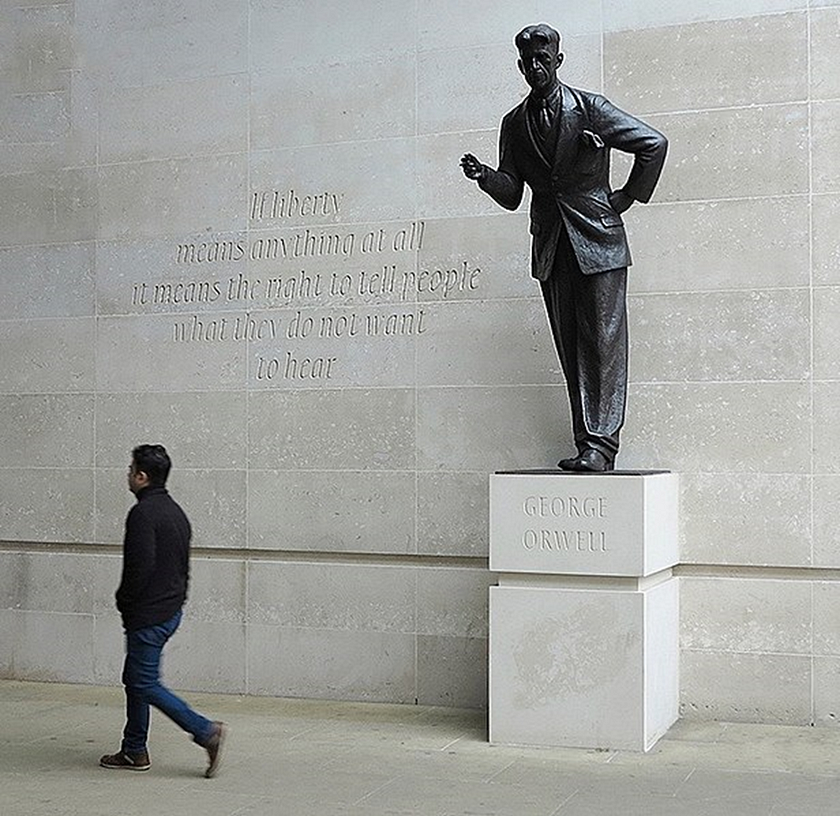Fearless Direct Awesome Perspective Provided Unique Gift for Readers Article 8 of an 8-article series.

Dear Reader,
This is the final article (8 of 8) of our 8-article series on George Orwell. In article 7 we covered the final months and death of Blair, Blair married Brown, and Blair was buried. We also looked at Blair’s literary career and legacy, literary influence, and Blair as a literary critic.
In this article, we will cover reception and evaluations of Blair’s (Orwell’s) works, his influence on language and writing, modern culture and how he helped shape it, and a statue of the man.
Reception and evaluations of Orwell’s works
Orwell’s works have been adapted for stage, screen, and television. They have also inspired commercials and songs, and he is often quoted.
Historian John Rodden called him a “cultural icon”.
Author and Journalist Arthur Koestler said that Orwell’s “uncompromising intellectual honesty made him appear almost inhuman at times”.
American author, neoconservative political commentator, and demographer Ben Wattenberg stated: “Orwell’s writing pierced intellectual hypocrisy wherever he found it”.
Piers Brendon (historian and biographical writer) said: “Orwell was the saint of common decency who would in earlier days, said his BBC boss Rushbrook Williams, ‘have been either canonized — or burnt at the stake’”.
Raymond Williams (Welsh socialist writer, academic, novelist, and critic) in Politics and Letters: Interviews with New Left Review describes Orwell as a “successful impersonation of a plain man who bumps into experience in an unmediated way and tells the truth about it”.
Christopher Norris (British philosopher and literary critic) declared that Orwell’s “homespun empiricist outlook — his assumption that the truth was just there to be told in a straightforward common-sense way — now seems not just naïve but self-deluding”.
The American professor and editor of the journal of American Studies Scott Lucas described Orwell as “an enemy of the Left.”
John Newsinger (British historian and academic) has argued that Scott Lucas could say this by portraying “all of Orwell’s attacks on Stalinism [–] as if they were attacks on socialism, despite Orwell’s continued insistence that they were not”.
The curriculum in school literature in England places Orwell’s work as prominent. Animal Farm is a regular examination topic at the end of secondary education. Nineteen Eighty-Four is a topic for subsequent examinations below the university level. In 2016, a UK poll saw Animal Farm ranked the nation’s favorite book from school.
In Orwell’s Victory, Christopher Hitchens argues: “In answer to the accusation of inconsistency Orwell as a writer was forever taking his temperature. In other words, here was someone who never stopped testing and adjusting his intelligence.”
John Rodden points out the “undeniable conservative features in Orwell’s physiognomy” (etiquette) and remarks about how to some extent Orwell facilitated the kinds of uses and abuses by the Right that his name had been put to. In other ways, there has been the politics of selective quotation.”
Rodden refers to the essay “Why I Write”, in which Orwell refers to the Spanish Civil War as being his “watershed political experience”, saying: “The Spanish War and other events in 1936–37, turned the scale.
Thereafter I knew where I stood. Every line of serious work that I have written since 1936 has been written against totalitarianism and for democratic socialism as I understand it.
Influence on language and writing
Orwell wrote about the importance of precise and clear language in his essay “Politics and the English Language” (1946), Orwell argued that vague writing can be used as a powerful tool of political manipulation because it shapes the way we think.
Orwell provided six rules for writers:
- Never use a metaphor, simile, or another figure of speech that you are used to seeing in print.
- Never use a long word where a short one will do.
- If it is possible to cut a word out, always cut it out.
- Never use the passive when you can use the active.
- Never use a foreign phrase, a scientific word, or a jargon word if you can think of an everyday English equivalent.
- Break any of these rules sooner than say anything outright barbarous.
Orwell worked as a journalist at The Observer for seven years, and its editor David Astor gave a copy of this celebrated essay to every new recruit. In 2003, literary editor at the newspaper Robert McCrum wrote, “Even now, it is quoted in our style book”. Journalist Jonathan Heawood noted: “Orwell’s criticism of language is still taken very seriously.”
Andrew N. Rubin argues that “Orwell claimed that we should be attentive to how the use of language has limited our capacity for critical thought just as we should be equal with concern about how dominant modes of thinking have reshaped the very language that we use.”
The adjective “Orwellian” implies an attitude and a policy of control by propaganda, surveillance, misinformation, denial of truth, and manipulation of the past.
In Nineteen Eighty-Four, Orwell described a totalitarian government that controlled thought by controlling language. This made certain ideas unthinkable.
Several words and phrases from Nineteen Eighty-Four have entered the popular language.
“Newspeak” is a simplified and confusing language designed to make independent thought impossible.
“Doublethink” means holding two contradictory beliefs at the same time.
The “Thought Police” are those who suppress all dissenting opinions.
“Prolefeed” is homogenized, manufactured superficial literature, film, and music used to control and indoctrinate the populace through docility.
“Big Brother” is a supreme dictator who watches everyone.
Other neologisms from the novel include, “Two Minutes Hate”, “Room 101”, “memory hole”, “unperson”, and “thoughtcrime”, as well as providing direct inspiration for the neologism “groupthink”.
Orwell may have been the first to use the term “cold war” to refer to the state of tension between powers in the Western Bloc and the Eastern Bloc that followed World War II in his essay, “You and the Atom Bomb”, published in Tribune on 19 October 1945. He wrote:
“We may be heading not for general breakdown but for an epoch as stable as the slave empires of antiquity. James Burnham’s theory has been much discussed, but few people have yet considered its ideological implications — this is, the kind of worldview, the kind of beliefs, and the social structure that would prevail in a State which was at once unconquerable and in a permanent state of ‘cold war’ with its neighbors.”
Modern culture
Apart from theatre adaptations of his books, several stage plays were written with Orwell as one of the main characters.
- In 2014, a play entitled Orwell in America was written by playwright Joe Sutton. It was first performed by the Northern Stage theatre company in White River Junction, Vermont. It is a fictitious account of Orwell doing a book tour in the United States (something he never did in his lifetime). It moved off-Broadway in 2016.
- In 2017, the play Mrs. Orwell written by British playwright Tony Cox opened at the Old Red Lion Theatre in London before transferring to the Southwark Playhouse. It centers on Orwell’s second wife Sonia Brownell (played by Cressida Bonas), her reasons for marrying Orwell, and her relationship with Lucian Freud.
- In 2019, the play 101 written by Cameron Hindrum, was performed by the Tasmanian theatre company Blue Cow. In this play, Orwell is seen working on his novel 1984"while keeping his severe illness at bay and balancing the demands of fatherhood, art, family and success.”
Orwell’s birthplace, a bungalow in Motihari, Bihar, India, was opened as a museum in May 2015, several years after residents petitioned for the conservation of the building.
In January 2021, Orwell’s bust near the museum was vandalized. Reviews for the George Orwell Birthplace Museum posted on Google since then suggest the museum is not in good shape. The Orwell Society was founded in 2011 to promote understanding of the life and work of George Orwell.
Statue
A statue of George Orwell, sculpted by the British sculptor Martin Jennings, was unveiled in 2017 outside Broadcasting House, the headquarters of the BBC.
The wall behind the statue is inscribed with the following phrase: “If liberty means anything at all, it means the right to tell people what they do not want to hear”. These are words from his proposed preface to Animal Farm and a rallying cry for the idea of free speech in an open society.

This is the final article in our 8-article series on George Orwell. If you have not read the other 7 articles, please do so. I believe you will find this information to be both interesting and hopefully helpful toward getting to know some of the history related to writing.
I enjoyed researching the information and hope you enjoyed reading it. If you have positive comments or constructive criticism relating to these articles, please let me know. Many thanks for taking the time to read the information that I presented.
This is the end of article 8 of an 8-article series on George Orwell. Thanks for following along.
If you liked this article, please clap for it, mark yourself as a follower of mine, and join me on my journey in writing as I contribute to various publications on medium.com.
The more time people spend reading my articles, the more it encourages me to continue writing. Many thanks for taking the time to read what I have written. Get access to unlimited articles here on Medium!
Your small membership fee supports Terry Day and other writers you read. You’ll also get full access to every story on Medium. What a bargain!
Where else can you read articles written by artistic and creative authors on so many different topics for $5 a month?
If you are not yet a medium member, please consider membership ($5 is a steal) and mark yourself as one of my followers. My account on Medium is @tday597706. Many thanks in advance for your support!
Please join my email list, this allows you to be notified as soon as I post something new. My writing success depends on readers like you who appreciate and support my writing. Thanks so much for taking the time to read and support me.